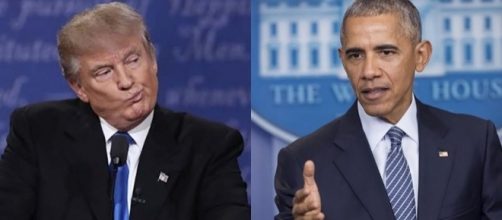The unsubstantiated accusation of Wire Tapping Trump Tower, by the Obama administration during the 2016 election campaign came from Donald Trump, Saturday March 4, 2017. The FBI refuted the charges made by Trump to the Justice department, stating that there was no evidence to prove such an accusation; however, Trump doubles-down.
The trickle-down
One prominent source tells us that after Trump's speech to Congress on Tuesday, his team's inability to overcome the allegations about his advisers' ties to Russia reflected frustration his tweets, and thus, according to one White House official “Trump lashed out at his senior team during an Oval Office meeting Friday.”
Another source indicates that “Trump has been trailed for months by questions about his campaign's ties to Russia.
The questions have been compounded by U.S. intelligence agencies' assessment that Russia interfered with the election to help Trump triumph over Hillary Clinton, along with disclosures about his aides' contacts with a Russian official.”
And as such, those disclosures cost retired Gen. Michael Flynn his job as national security adviser and prompted calls from Democrats for Attorney General Jeff Sessions to resign. However, Sessions recused himself from the FBI probe after acknowledging he did not disclose his campaign-season contacts with the Russia's ambassador to the United States when asked during his confirmation proceedings. Saturday morning Trump said that he had "just found out" the information, regarding the wire tapping allegations, but it was unclear whether he was referring to a briefing, a conversation or a media report.
Speculation has it that Trump seems to be making the allegations based on a Breitbart News article Friday and recent claims by conservative radio host Mark Levin that the Obama administration made Foreign Intelligence Surveillance Court (FISA) requests in 2016 to monitor Trump communications and a computer server in Trump Tower, related to possible links with Russian banks. Nonetheless, The White House did not respond to questions about what prompted the president's accusations that Obama had tapped his phones. Furthermore, White House policy substantiates that “Presidents cannot legally order wiretaps against U.S. citizens. Obtaining wiretaps would require officials at the Justice Department to seek permission from the Foreign Intelligence Surveillance Court, which is shrouded in secrecy.”
Grounds for libel begin
As an irrational consequence to this matter, “President Donald J.
Trump is requesting that as part of their investigation into Russian activity, the congressional intelligence committees exercise their oversight authority to determine whether executive branch investigative powers were abused in 2016.” This statement comes after the allegation by Trump that former President Obama ordered phones wiretapped at Trump Tower.
Moreover, Trump compared the alleged events to “Nixon/Watergate” and “McCarthyism!” And he called Obama a “Bad (or sick) guy.” Nevertheless, lawmakers from both parties called on Trump to offer proof and to say what he knows to the public.
There are two aspects of Donald Trump's behavior that become suspect. As Rep. Jim Hines (D-CT) Intelligence CMTE.
responded: “Either he traded in rumor and conspiracy theory as the president of the U.S. Or he disclosed the existence of a FISA warrant which is not a good fact for his contention that there is absolutely nothing going on with him and the Russians.”
The law states that in a libel or slander suit, the plaintiff must show evidence of four elements: the defendant conveyed a defamatory message; the material was published, or conveyed to someone other than the plaintiff; the plaintiff could be identified as the person referred to; and the plaintiff suffered injury to their reputation as a result of the communication. Contrary to established beliefs, something is fowl with the "smoke screen" that Donald Trump righteously contends at the expense of former president Obama.

